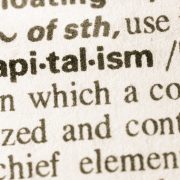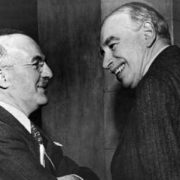I teach several different “capstone” courses, courses for students about to graduate and go off into the world. One of the most surprising things about these otherwise well-educated students is that they cannot summarize the basic argument for capitalism.
It’s fine that they might not be persuaded by the argument; that’s a matter of personal conscience and understanding of how the world works. What I find bizarre is that they cannot even summarize the argument coherently. At best, they might say something about self-interest, or freedom. That’s even the ones who like capitalism, mind you. The opponents will say something about greed, and inequality, and maybe exploitation.
I have found it useful to summarize the argument for capitalism briefly, and in some ways superficially. First, wealth is stuff that is useful to us. It can be food, drink, or more convenient ways to obtain food and drink. It can be clothing, housing, transportation, or video games or movies that are delivered to our homes or to theaters, to be available in the event we decide to avail ourselves of the opportunity.
These things are being provided almost constantly, in the background, without any of us really noticing. Ships, airplanes, and trucks are operating on tight schedules to deliver remarkably fresh food products to stores. But we only notice those avocados, or MP3 players, when they are already in the bins, ready to be purchased, or not purchased if we decide we don’t want them. In other words, consumers get a lot of inexpensive, high-quality stuff, but all the risks are borne by the system, not by the consumer.
That’s wealth.
There are three elements to the argument for capitalism, and while they connect in crucial ways they can be separately defined. Those three elements are (a) division of labor; (b) impersonal exchange based on prices; and (3) economies of scale based on knowledge.
A. Division of labor
It is only a slight simplification to claim that all the increases in wealth, all of them, since the beginning of time, have been the result of division of labor. If four of us all individually produce everything each of us needs, we don’t have much stuff. We will stagger along on the edge of subsistence, and some of us may not survive.
If the four of us make a deal, and one produces clothing, one shoes, one food, and one housing and water supplies, each of us will get better at doing the one thing we specialize in. The result is that, instead of subsistence, the population can grow. The group can now support more people. Each person faces a “make or buy” decision, and if you can buy something more cheaply than you can make it, you specialize in what you are good at and buy everything else.
This feeds back on itself: instead of one person specializing in each activity, there are now 24 people and 6 people working at each activity, dividing the making of shoes into six different stages, with the consequent increases in productivity in each stage now multiplying the amount of wealth available.
And new activities become possible, with some of the population now providing artistic accomplishment or entertainment. Before, with the small, unspecialized population, music was provided by one guy beating on a hollow log with sticks.
Now, with the larger population and division of labor, we reach a population of 10,000 in our city, and we have a string quartet, or maybe even a chamber orchestra. A few people may be spending their time writing new musical compositions (wealth can be culture, not just shoes!).
B. Impersonal exchange based on prices
At some point, the city walls cannot contain the exuberant wealth creation of capitalism. For centuries, city-states were the limiting factor on the division of labor, because institutions of transportation and finance hindered regional trade and made global trade impractical. Trade and exchange took place within the city-state, and larger city-states were more wealthy because they could support more division of labor.
But capitalism wants to be global, because division of labor is limited by the extent of the market. In a larger “market,” more different people are working for you. That means that the diversity and quality of products simply explodes, and prices fall. Of course, just as local division of labor meant individuals had to specialize, now cities and regions begin to specialize. Now, cities and regions face the “make or buy” decision, and they become wealthy precisely to the extent that they can focus on what they do best, and buy everything else.
This pressure to expand the extent of the market has some surprising effects. To consumers, all costs are transaction costs. So entrepreneurs turn their creative energies to devising institutions to reduce transaction costs. Transportation, finance, accounting, futures markets, and insurance all become activities that both create value for consumers all over the world and create good livelihoods for their practitioners. The need for an ability to raise and redirect liquid capital, quickly and across great distances, gives rise to an entire financial sector.
The result is that huge and impossibly complex arrays of information are summarized in simple parameters called “prices.” Prices signal the relative scarcity of products, inputs, and commodities, and create systems of dynamic adjustment that are breathtakingly efficient.
If there is a shortage of something, for a variety of reasons that may be hard to summarize, prices send out the signal of scarcity by rising. Then, almost miraculously, the problem of the shortage is quickly solved, by the three consequences of price increases: (i) consumers buy less, leaving some of the scarce item for others; (ii) producers make more, providing more of the scarce item; and (iii) entrepreneurs devise substitutes, easing the pressure of the shortage.
Folks who don’t understand capitalism always want to manage prices. But freely adjusting prices ensure that shortages will always be quickly mitigated, even if no one knows what the cause of the problem is. Prices are signals for all the decentralized actors, in myriad places and without any communication among them, to all cooperate in solving shortages.
The result is that each of us buys things from thousands of other people we don’t know, will never meet, and yet can trust completely to work for us and make the things we need.
C. Growth based on economies of scale
When someone discovers a better way to do something, or a new way to serve consumers, the results are communicated rapidly through the system. On millions of dimensions, some large and some small, right now entrepreneurs are beavering away looking for knowledge. An improvement in technology or an expansion in the ways we can use liquid capital to create physical capital immediately improves the welfare of the whole world. Economists call this an “economy of scale,” which means that specialization and increased social capital in the form of discoveries quickly spread around the world as force multipliers for labor and entrepreneurs.
Where once we lived in a world where there was a relatively fixed amount of stuff, the division of which meant the only way for me to get more is for you to have less, in a world of global capitalism we can all have more, at the same time. Much of the new “wealth” is digital, and takes the form of music, movies, or other entertainment, or software, code that once written down can be reproduced at no cost and transmitted worldwide essentially for free. Products or computer code devised for one purpose can be redirected and reused for new activities that at this point we can’t even imagine.
As I said at the outset, I understand that this discussion, with three separate facets of capitalism, is superficial and inadequate. But if our seniors, attending their thousands of graduation ceremonies at all those different colleges and universities, had even this level of understanding of the argument for capitalism it would be a big step forward.
Michael Munger is Professor of Economics at Duke University and Senior Fellow of the American Institute for Economic Research.













